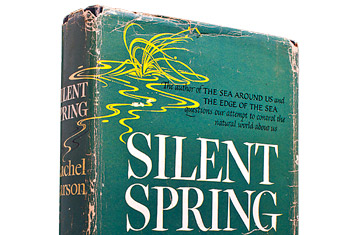
When my predecessors at time reviewed ecologist Rachel Carson's book Silent Spring 50 years ago this month, they were less than impressed. While the piece praised her graceful writing style, it argued that Carson's "emotional and inaccurate outburst" was "hysterically overemphatic," which I believe is a fancy way of saying that the lady writer let her feelings get the best of her.
TIME's take was gentle compared with the reactions of some of her other contemporary critics. As William Souder writes in his new biography of Carson, On a Farther Shore, chemical companies threatened her with lawsuits after she argued that pesticide overuse was ruining the environment and threatening human health. Others insinuated that she was in league with communists who wanted to cripple American agriculture. As a former chemical-industry spokesman put it bluntly, "If man were to follow the teachings of Miss Carson, we would return to the Dark Ages, and the insects and diseases and vermin would once again inherit the earth."
Today Silent Spring is regarded as a masterpiece, one of the most influential books of the 20th century. The criticism of Carson--and the sexism implicit in much of it--is a relic from an age devoted to better living through chemistry. Yet 50 years after its publication and 48 years after Carson's untimely death from breast cancer, there's still a small but vibrant industry in attacking Silent Spring and its author.
The claim now is that her polemic against pesticides led the world to phase out the insecticide dichlorodiphenyltrichloroethane, or DDT. That might seem like a good thing. In Silent Spring Carson describes the toxic effects of DDT use on animals, particularly birds, and in 1972 the Environmental Protection Agency banned it partly on the grounds that it was a probable human carcinogen. So long-lived and potent is DDT that even now, 40 years after the ban, most Americans still carry traces of the chemical in their bodies.
But DDT was also effective in killing the mosquitoes that carry malaria. Conservative critics have argued that by turning the world against DDT, Carson crippled efforts to fight the deadly disease in Africa, where it kills hundreds of thousands of people a year. The right-wing Conservative Enterprise Institute maintains a website called RachelWasWrong.org arguing that Carson's "extreme rhetoric generated a culture of fear, resulting in policies that have deprived many people access to life-saving chemicals," namely DDT. In 2005, British politician Dick Taverne wrote that "the anti-DDT campaign that she inspired was responsible for almost as many deaths as some of the worst dictators of the last century."
